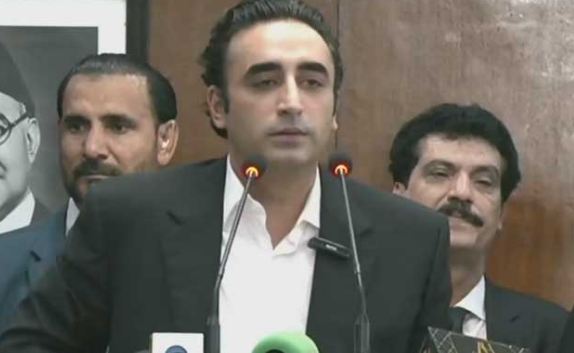KARACHI: Pakistan Peoples Party (PPP) Chairman Bilawal Bhutto Zardari has categorically said that the formation of a constitutional court is essential, and his party will ensure its establishment, come what may.
Addressing the Sindh High Court Bar Association, the PPP chief said that the 19th Amendment was introduced under duress “following a threat from the Supreme Court”.
“The judicial reforms will be undertaken in line with the Charter of Democracy (COD), come what may,” he vowed.
Bilawal continued that parliament had replaced the judges’ appointment procedure with a globally recognised law through the 18th Amendment.“In the United States, the entire parliament decides on the appointment of judges; that is why martial law is never imposed in the US,” he said.
Terming the late prime minister Zulfikar Ali Bhutto’s death sentence a “judicial murder”, Bilawal said that it was “necessary and also our compulsion” to establish a constitutional court to ensure that no other prime minister faced execution and that justice would be served to the people.
He criticised military rulers and remarked that his mother, Benazir Bhutto, had experienced the brutal regime of military dictator General ZiaulHaq, during which all political workers suffered severe torture. The politician recalled, “Shaheed Benazir knew that our system was broken. At that time, IftikharChaudhry was not a revolutionary but a PCO judge.”
“Nor was there any dam wala judge,” Bilawal said, alluding to ex-CJP MianSaqibNisar without naming him.
He explained that a decision was made to form a constitutional court to meet the people’s demand for justice “when courts were fixing the prices of pakoras and tomatoes”. He said that a federal constitutional court was “a necessity to end provincial disparities.”
Bilawal said if we want to strengthen the judicial system, want that our citizens are given speedy justice and that there is no longer any disparity between the provinces, then an FCC is a necessity. He said the PPP stressed that equal provincial representation would be required at the FCC, with its chief justice on rotation. This will allow every provincial representative to have their turn at the position.
Stressing the need for constitutional courts, he said only 15 per cent of the Supreme Court’s cases were constitutional, “yet these occupy 90pc of time”.


